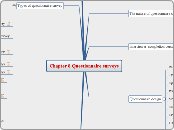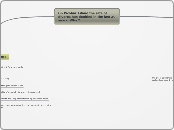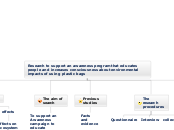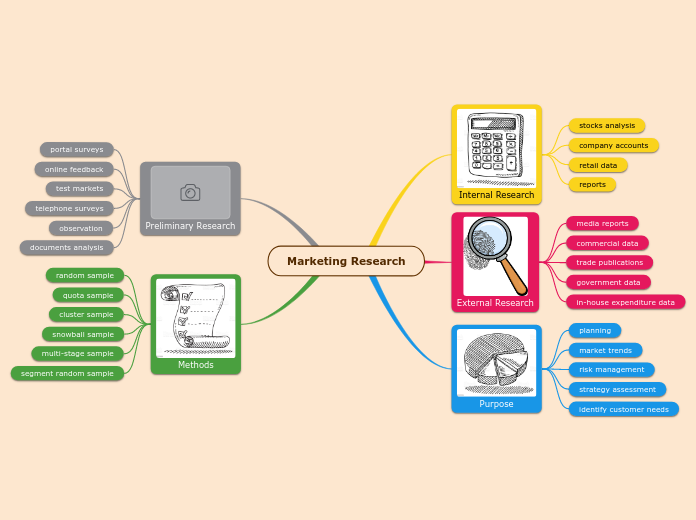Chapter 8 Questionnaire surveys
Leave senstive questions until later
Start with relevant questions
Start with easy questions
People's attitudes and opinions should be explored to examize. Some examples are given in Figure 8.7
Scales generally
Existing scale
Reinvent the wheel
Myers-Briggs Type Indicator
Semantic differential
Attitude statements
There is a relationship between the attitude and sacle and the relationship might affect the survey data.
Likert scales
What is the standard of the scales? Their agreement or disagreement related to the factor?
Ranking
It is necessary for respondents to rank items?
Open-ended direct questions and checklists
Some principles which the researchers should avoid: avoid jargon, simplify wherever possible, aviod ambiguity, avoid leading questions and ask only one question at a time
Pre-coded question
Response rates can be very low
Laborious and result in a final set of categories
Open-ended question
Advantage: Not influenced by other facters
Individuals and organisation's characteristics
Some individual's elements might influence the organisation's elements such as income influences captial, education influences sales or number of clients.
WHY?
WHAT?
WHO?
Comparsion between the research and previous research on the topic or related topics
The form of hupotheses,theories,models or evaluative frameworks should be clear and should guide the questionnaire design process.
Questionnaire design
Introductory remarks
Filters
Layout
Ordering of questions
Measuring attitudes and opinions
Wording of questions
Open-ended and pre-coded questions
Types of information
Research problems and information requirements
Types of questionnaire survey
Organisation surveys
Organisation surveys can take a variety of forms including telephone surveys, mail-outs or captive group surveys. They can be interviewer-completed or respondent-completed. In choosing a sample it needs to be recognized that senior staff can usually provide more reliable information concerning the operation of their administrative units than junior staff, but senior staff may be unable to describe the experiences and perceptions of lower level employees.
Captive group surveys
Interview method can also be used with captive groups, although this is not as cost-effective as respondent-completed questionnaires.
THe research advantage of a captive group is that access to members of the group is usually facilitated and members of the group are gathered together in one place at one time.
Customer/visitor on-site intercept survey
Customer survey method could have been fairly multipurpose.
Respondent-completion
Customer surveys by interview is generally preferable to respondent completion. It is reasonable to expect interviewers in such situations to complete about six interviews in an hour.
The customer survey should be more specific and convenient way to gathering data on a particular activity.
How to have a specific survey in a particular acitivity??
Interviewer-completion
When respondent completion is thought to be desireable or necessary, sufficient staff should be employed to collect completed questionnaires.
E-survey
E-survey is confined to those with access to the Internet and, while the sending of reminders is cheap.
Email can be used simply to transmit a letter of request and an attached copy of a questionnaire to potential respondents. Respondents can print out the attached questionnaire, fill it out and mail it back to the researcher.
The mail survey
Advantage: a large sample can be surveyed at low cost.
Compare to the telephone survey, how come the email survey is so easy to get the email address?
Is that the respondent tell the researchers other respondents the email address?
The problem of response rates
Low resonse rates
7 factors affecting mail survey responses: 1 the interrst of the resondent in the survey topic
2 The length of the qyestionnaire
3. Questionnaire design, presentation and complexity
4. The style, content and authorship of the accompanying letter
5. The provision of a reply-paid envelope
6. Rewards for responding
7. The number and timing of reminders and follow-ups
The telephone survey
Advantages
Easy to conduct in computers
To protect the respondents' privacy
Qucik and relatively cheap to conduct
three limitation
Respondents not shown display items
Rrecord not so exactly.
Length of interview
How to controll the telephone survey time?
Exclude non-telephone subscribers
How to solve the problem that some people who do not have telephone or have mobile phone not list in the white pages? The explanation is neglect the people because the people are not the main representation of the society.
Question: How about the roth of the people?
The people might grow into the main parts in the community.
So I think the point is not so correct. At last, not preferctly right.
Street/quota intercept surveys
Ex: Quota sampling
How to do adjustment
Two limitations
2.Representative or not?
1.Hurry up interviewees
The household questionnaire survey
Advantage: They are generally respresentative of a defined community. It cover an amount of people who are in different occupation.
Problem: The respondents might be too busy to fill the survey so that the researchers should have responibilty to make the survey prefectly.
The combination of interviewer-completed and respondent-completed elements. For example, when the research is related to the society, it should be foucsed on the groups who are in the same traits and individuals who are different from others.
Disadvantage: the most expensive to conduct.
Ex: Omnibus surveys
Clients collect and design the questions about age,gender or family to contribute the data.
It is very benefical because the clients know their needs and ideas demanded by the respondents so that they can design the questions very suitable for the repondents.
Interviewer-completion versus respondent-completion
Respondent-completed
fill out the questionnaire for self
Sometimes, Email is a better choice for the research.
Pathy response, incomplete response, risk of frivolous responses, more care needed in layout and presentation.
the respondent's level and design easy questions
Cheaper, quicker, relatively anonymous
Interviewer-completed
The script for an interview
Disadvantage
Higher cost, less anonymity, exaggerated desire to please interviewer
Advantage
More accuracy, higher response rates, fuller and more complete answers, and design can be less' user-friendly'
Merits of the questionnaire survey method
Collect, analysed and interpreted.
Capturing complexity
Comparability
Recently survey
Former survey
Succinct presentation
Transparency
How and what?
To provide some clear research methods to keep the survey transparent.
Quantified data for decision-making
An ideal means of providing quantified information for organisations
The nature of questionnaire sueveys
Questionnaire or interview schedule; the garthering of information from individuals using a formally desgined schedule of questions.
Proportion or sample is based on the researchers interested in.
Problem; Some respondents may exaggerate the results when they are interviewed. The researchers should avoid the falling into the trap of believing that TRUTH.
Subjects
Coding in Chapter 13
Respondents
How to attract the resppndents??
Proportion or sample
Process









